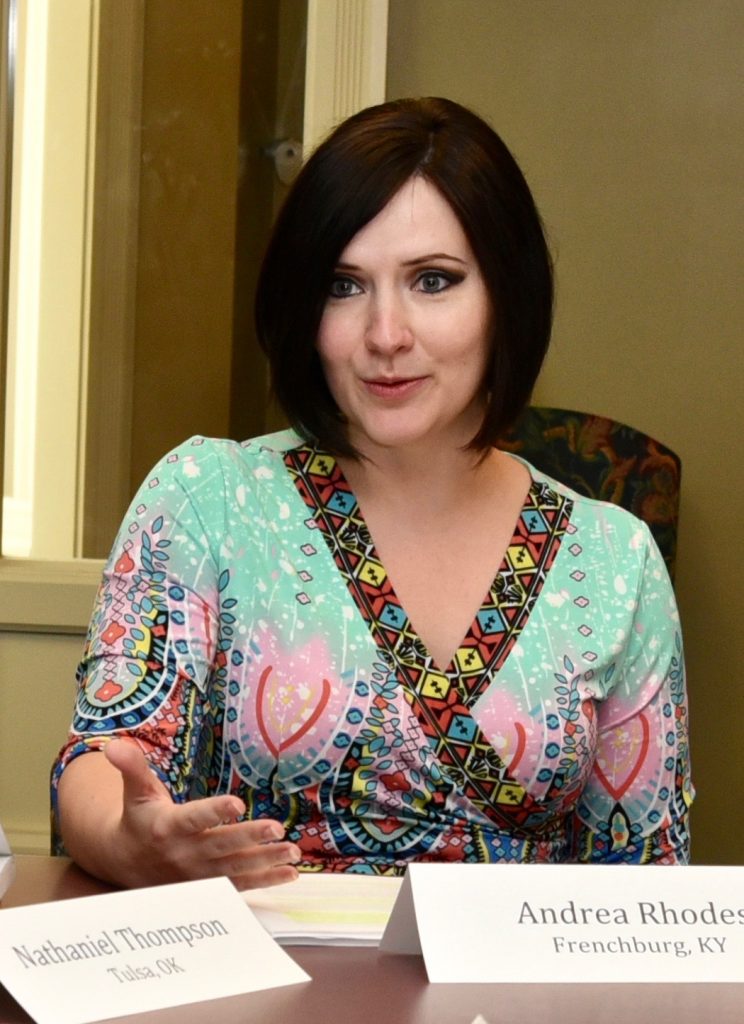Building Hope and Resilience in Rural Kentucky: An English Teacher Uses Historical Documents
December 24, 2020


Andrea Rhodes teaches junior-level English at Powell County High School in Stanton, Kentucky. Primary historical documents—autobiographies, letters, speeches and essays written by earlier Americans—comprise a large part of what her students read. To learn more about these first-person accounts of the past, Rhodes is working toward a degree in Ashbrook’s Graduate degree program.
“English teachers often overlook the value to be derived from helping students comprehend nonfiction,” Rhodes says. “Yet during their adult lives, most students will spend much more time reading informational texts than reading short stories and novels. The skills they’ll build by grappling with difficult nonfiction texts will make reading literature seem very simple by comparison.”
Imparting a practical skill is one motive for Rhodes’ approach. More important, Rhodes wants her American literature class to make students aware of their heritage. “Literature is inextricably linked to history. Studying the two together helps you understand the philosophical undergirding of your culture.”
Rhodes entered Ashbrook’s graduate degree program in the summer of 2017, immediately after completing her BA in University Studies. At Morehead State University, she’d been a somewhat older student, having gone back to complete her degree after her daughter entered kindergarten. She’d had the time to understand what she hoped to accomplish as a teacher.
She was interested in a particular educational model, “classical education,” based on the traditional Western practice of emphasizing fact acquisition in early primary years, reasoning skills in the middle years, and rhetoric—the skills of self-expression—in adolescence. At each stage, studentsbuild their knowledge in the order in which western culture as a whole acquired knowledge. Classes are taught in an interdisciplinary fashion, so that literature is taught along with the history of the period in which it was written. Rhodes completed an undergraduate capstone research paper that asserted the superiority of the classical model in training the mind and teaching students to learn for themselves.
In high school, Rhodes felt, students learning to express themselves need to study examples of polished rhetoric. They also need to consolidate their own sense of who they are and how they relate to society. They need to articulate the principles that will guide them through life.
This is critical for students living in a rural, economically underdeveloped county. “We are a Title I school; 100% of our students receive free or reduced price lunch. Here, unfortunately, opioid addiction is being passed down generationally. Many students don’t see a way of bettering their lives.” One way of instilling hope in students, Rhodes feels, is to help them grasp the essential American idea: that we are all born equal, and equally capable of self-government.
Rhodes begins her American literature course with excerpts of political philosophy that influenced the American founders, such as John Locke’s Second Treatise of Government. This is followed by a robust selection of the founders’ own writing: Thomas Paine’s Common Sense, the Declaration of Independence, the Constitution, and portions of The Federalist.
After this, students tackle literature of the colonial period, reading the Narrative of the Captivity and Restoration of Mrs. Mary Rowlandson, the story of a woman captured and held for ransom by Native Americans in 1676, during King Philip’s War. Rowlandson’s account of her three-month ordeal demonstrates courage, ingenuity, and religious faith. It also shifts the usual perspective on the conflict between European settlers and indigenous Americans. “My students are surprised to discover that sometimes the settlers were the victims of the conflict,” Rhodes says.
Arriving at the literature preceding the Civil War, Rhodes helps students make sense of the conflict between slaveholders and those who saw slavery as a betrayal of American principles. “In my Sectionalism and Civil War class with Ashbrook, we read excerpts from the eugenic scientists of early 19thcentury. It was their ‘settled science’ that African Americans were an inferior race. I show my students this, and then we read the Narrative of the Life of Frederick Douglass.”Douglass, who escaped from slavery after secretly teaching himself to read and write, became a highly influential advocate for abolition.
“His short autobiography packs in a lot, and my students love it. He writes eloquently, embodying intelligence and an elevated perspective. Hearing him speak, people who before had bought into the eugenics of the time would change their minds.” Rhodes wants her “reluctant readers” to see that Douglass claimed his freedom by reading widely and developing his own power of expression.
“I didn’t study political science or history as an undergraduate,” Rhodes says, yet she often heard professors in other fields projecting biased political messages. Because Ashbrook’s graduate program focuses on what earlier Americans “actually said and did, instead of the pre-digested accounts by historians who tell you what to believe,” Rhodes has been able to form her own sense of American history. She is convinced of“the greatness of American origins,” and she wants to make this perspective available to students. “Many young Americans today feel ashamed of America and speak apologetically about our history. I try to give them insight into the reasons they can be proud of America and what we’ve accomplished as a country.”
The unending, free debate among citizens striving to reconcile their principles and practice is perhaps America’s greatest accomplishment. It validates the central American conviction: that citizens can govern themselves through reason and careful choice. Rhodes and her colleagues relish the opportunity to join this long conversation in every Ashbrook seminar. “I dread the day that I finish the degree, because I’m going to miss the program so much,” Rhodes says.

